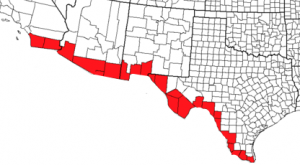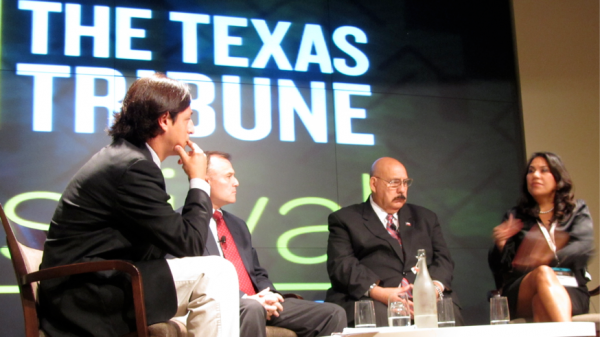Juggling Optimism & Pessimism In U.S.-Mexico Relations
Austin, Texas — The complexity of the issues both Mexico and the United States face in working together to come up with solutions to the drug war makes the situation for both nations very unique. How is it that we choose to address this complex issue? Do we take an optimistic stance, looking at what is happening and the opportunities that may arise or already in front of us? Do we let our emotions get in the way of how we view each other as neighbors? What about the impact this war on drugs has on our neighbors that live further down the street in Guatemala, El Salvador, and Panama?
Vice President of Intelligence of Stratfor Fred Burton, Mayor Raul G. Salinas of Laredo, and El Paso County Judge Veronica Escobar took a stab at discussing the different perceptions they held on the violence in Mexico on Sunday morning at the Texas Tribune Festival. Each of them agreed that this problem affects both the U.S. and Mexico but their ideas and solutions towards solving this reality that is affecting the border towns, families, and economies differed.
Escobar said the U.S.’s role needs to be to address this problem, “because it needs to find a way to create policy with our neighbor and trading partner.” She continued, “We need immigration reform. About 85% [of immigrants] are non-criminal folks essentially here because they are lured to the U.S. for a job.” She also advocated for working on “smarter initiatives,” giving the building of ports as an example.
Apart from her beliefs that we need to focus on building initiatives to improved economics around our borders, she also brought an emotionally, pessimistic view towards Mexican society. She stated, “If I get carjacked in Mexico, I don’t think I can trust the cops or authorities in Mexico to help me.” She even expressed that “the war on drugs for the U.S. is a failure.”
Fred Burton opened his discussion by talking about the importance geography plays in this issue. He explained it as an ultimate source of profiteering, which the cartels understand so well that they are beginning to utilize different regions of the world to expand. Burton said, “Atlanta and Los Angeles have fallen to the control of the Mexican Cartel networks.” Furthermore Burton notes about the cartel even moving further south in to Central America. “This is not just a Mexico problem anymore. This is a central and Latin America issue. We need to stop pointing the finger at Mexico.”
Burton further said how the FBI since 2001 has been focusing on counter-terrorism issues rather than on the issues that really deal with the complexities of the violence and drug war in both our countries. He said, “Texas is ground zero for this. Most of the drugs are flowing directly through Texas. As you get closer and closer to the border of Mexico, people [cartels] have more fights for geography.”
Laredo Mayor Raul G. Salinas brought in an aura of optimism in addressing these issues. “We have to show Mexico that we are partners. This is going to affect Mexico and the United States and even job creation. Those trucks coming across every day are jobs for the United States!” After the discussion we spoke to Salinas, as well as Escobar.
Interview with Laredo Mayor Raul G. Salinas
NewsTaco: What are your solutions as leaders that have already agreed that we needed to work with Mexico to solve this issue?
Salinas: I think you have to use good role models. We have a Latina Supreme Court Justice Sonia Sotomayor that came from humble beginnings, got a education and made it too the highest court. We need to communicate what good they can accomplish but also show the dangers that exist on the other side.
NewsTaco: When discussing the children population, how do we prevent our kids from even falling in the trap of the cartel? On both sides of the border?
Salinas: We just have to tell them that’s not the way to do it, and that we need to be better role models for them as parents so that they don’t fall in to that trap.
NewsTaco: How we can inspire the youth of border communities on both sides to not look to cartel activity as a legitimate avenue of income?
Salinas: It doesn’t matter you are from; we are enriched with two cultures. And as Latinos who live on the borders, we cherish our mothers and I always tell kids to not do anything to embarrass their family name.
Interview with El Paso County Judge Veronica Escobar
NewsTaco: What is your personal policy prescription regarding the violence in Mexico?
Escobar: I have been advocating for comprehensive immigration reform since my time in grad school. Without reform, we face a diminished resource pool to tackle the violence. We make strategic choices with funding that are not very wise. For example when we use personnel to apprehend economic migrants instead of criminals. I also believe we need more investment into our ports instead of building walls.
NewsTaco: What then should we value moving forward in the debate?
Escobar: We need to value honesty. The rhetoric recently has portrayed border communities negatively, as opposed to places of opportunity. Everyone across the state should care about a healthy border because it affects the economy.
NewsTaco: And so how do we shift that mentality?
Escobar: We do that by talking about it. I try to redefine the border whenever I speak. It has to be framed that what success for us is success for the state and nation.
[Photo By Noddy]


